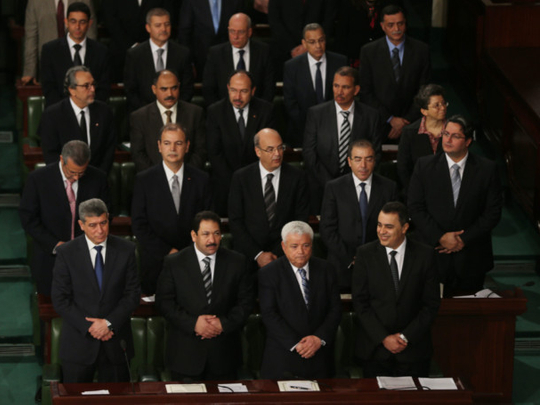
Tunis: Tunisia’s parliament on Wednesday approved a technocratic caretaker government tasked with leading the country out of a bruising political crisis and into fresh elections.
After a marathon session broadcast live on national television, the line-up proposed by Prime Minister-designate Mehdi Jomaa was approved by 149 lawmakers, with 20 voting against and 24 abstaining. The line-up was only agreed after weeks of horse-trading and will replace the government led by the Islamist Al Nahda party, which accepted last year to step down as part of deal to end a crippling political crisis.
Jomaa, who was industry minister in the outgoing government, announced on Sunday that he had finally clinched a deal on an apolitical line-up.
But he still faced a tougher than expected time Tuesday in parliament, where he spent more than 12 hours fending off accusations that his caretaker cabinet included members of Zine Al Abidine Bin Ali’s former regime.
The once-banned Al Nahda, now Tunisia’s largest party, and the secular opposition have been at loggerheads over the legacy of the revolution that toppled Bin Ali three years ago and touched off the Arab Spring.
The crisis deepened when two opposition MPs were assassinated by suspected jihadists last year.
“If you vote in favour of this government, you’re signing the death warrant of the revolution,” said one MP, Hichem Hosni.
The incoming justice minister, Hafedh Ben Sala, was the main target of lawmakers claiming that politicians tainted by their role in Bin Ali’s dictatorial rule were creeping back into government.
Jomaa said that he had selected his ministers on “competence, independence and integrity” but vowed to look into the accusations.
“If any of the ministers are found not to meet those three criteria, I promise to review” the government line-up, he said.
Under the roadmap agreed by Tunisia’s rival factions to end the impasse, parliamentary and presidential polls are due by the end of 2014.
Addressing parliament before the vote on his government line-up, Jomaa reiterated that his top priority was overseeing free elections.
He said that in the coming months his cabinet would also tackle the threat posed by the growth of jihadi groups and the huge social tension caused by unemployment.
In another late-night session on Sunday, parliament adopted a new constitution.
The new charter is the result of two years of acrimonious debate, including on the role of Islam and women’s rights, but is regarded as the most modern in the Arab world.
The adoption of the constitution was hailed as a milestone at home and abroad and the approval of the caretaker cabinet on Wednesday achieves another of the revolution’s goals.
In contrast, neighbouring Libya and Egypt remain mired in instability and crippling political deadlocks three years after the Arab Spring.












